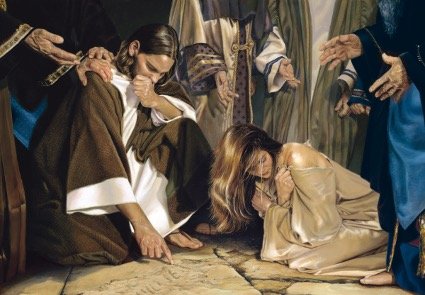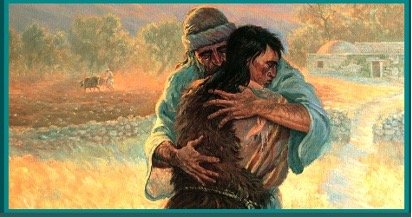
By F. Luis Casasus, General Superior of idente missionaries
Commentary on the Sunday Gospel of 02-03-18 Third Sunday of Lent (Book of Exodus 20:1-17; 1Corinthians 1:22-25; Saint John 2:13-25).
If you remember just one thing from today’s Gospel, remember this: You are God’s temple. Let us not simply look at the attitude of the merchants and the money-changers. This is an easy thing to understand: It is not at all impossible that the temple authorities connived at the practice and may have benefited if the traders had to rent spaces in the Temple to do their business. This would explain the priests’ anger at what Jesus was doing: What’s going on here? What sign can you show to justify what you are doing?
You are God’s temple. This is not only a beautiful and perhaps deeply anthropological phrase. This is of practical interest for at least two reasons.
- Just as Jesus cleared the Temple of all corrupting influences, he wants to purify us. Remember that John the Baptist spoke of Jesus baptizing with the Holy Spirit and with fire. This fire represents the tireless action of the Holy Spirit in two ways inseparably linked together:
- As an attractant bait. This purification means that we need to get rid of things that prevent us from reaching God. This includes a renunciation of things visible and created that obstruct our ascent to God. Above all, it is a question of union with God, which will lead to becoming a new person. In fact, because we come from God, we cannot be complete without Him. The invitation to love God and to give ourselves wholeheartedly to Him is precisely the call to be true to our identity and to our origin. Not to love like Him would be to betray our very being and our calling in life. In the first three Commandments, we are called to worship God: If we refuse to do it, then we forget our origin, our calling and our identity. This is our true, and often hidden aspiration.
- Carrying out a purification helping us to realize the presence, the intention and the profound, active love of God. In fact, we are purified by His mercy. As Pope Francis said: Do we allow Him to do a cleaning of all behaviors against God, against others and against ourselves, as we heard today in the first reading? Each one can respond to himself, in silence, in his heart. “Do I allow Jesus to make my heart a little cleaner? Jesus does not cleanse our hearts with a whip, but cleans with tenderness, with mercy, with love. Mercy is his way of cleaning.
The Holy Spirit is actually working from these two directions at the same time. And this is probably the main lesson to be drawn from this energetic moment in the life of Christ.
A nail would certainly question the value of a hammer. To the nail, the hammer is a cruel instrument. But what it should recognize that each blow forces the nail to bite deeper and hold more effectively. Without the hammer the nail would not be effective.
Similarly, individualistic, materialistic, “modern people” find it difficult to internalize the Ten Commandments and let alone viewing them as an act of God’s mercy. Purification is the key; only when we understand the Ten Commandments as a way of purification, as a reliable way to getting close to God, we are able to appreciate and understand their role in our lives. The Ten Commandments Saint Paul reminds us today that we need the permanent purifying action of the Holy Spirit: the foolishness of God is wiser than human wisdom, and the weakness of God is stronger than human strength.
Of course, the life and the words of Jesus go beyond the Commandments and the Law, by no means rejecting them, but showing us in everything the face and the loving plan of our Heavenly Father. To illustrate the answer of God to our fidelity to the Holy Spirit’s suggestions, here is a well-known tale about the temple mount in Jerusalem:
Before there was a temple, there were two brothers that lived on either side of the hill. One brother was wealthy yet he had no family. The other brother had very limited resources but he had a large family. One evening the wealthy brother was thinking of his brother on the other side of the hill. “My brother,” he thought “does not have much and he has many mouths to feed and here I am with all my wealth. I know what I shall do, every night under the cover of darkness I will take one sack of grain from my granary and carry it over to my brother’s and place it in his granary.” Now, that very same evening the other brother was thinking of his wealthy sibling. “My brother,” he thought “does not have the blessing of a family but he does have riches, I might as well help him grow even more in his riches. I will take a sack of grain from my granary every night and carry it to my brother’s granary and place it with his grain.”
The brothers began to do this every night, all the time not saying a word to the other about what they were doing. They were both amazed to see every morning that the number of sacks in their granaries remained the same although they had taken away a sack the previous evening. This all continued for a while until one night they met one another at the crest of the hill carrying their sacks of grain. Upon seeing one another they immediately realized what had been transpiring and they embraced one another in love. And upon their embrace the voice of God sounded from heaven: This is where I will build my house upon earth!
The moral of the tale: when we make the choice to love and to give then we open our hearts that God might come in and make a dwelling place within us. When we choose to love God in His intimate suggestions, He makes his home within and with us. This is the spiritual and deep meaning of the classical, old saying: it is neither our abilities nor our skills that define our character, rather it is the choices we make that truly define who we are.
2.To confirm us that the Holy Spirit is at work now, zealously, in each of our neighbors. When we listen and contemplate in prayer, we will understand not only who Jesus is, but also who we are and who our neighbor is. It is not enough to say that we are brothers; this also means that we all have the same need to be close to Christ, not only to endure the difficulties of our lives, but also to cooperate with him, to give up our lives for our neighbors.
People who live their lives without God can hardly live. If we are living without God, no matter what satisfaction we are experiencing, we will realize that it does not answer our deepest need. And so, he is bringing up before us the emptiness of our meaning and happiness apart from God in every occasion that we experience it. Is this awareness that inspires Jesus’ zeal for God’s house. This communion with our Heavenly Father is a primordial necessity, no matter what your beliefs or your moral life are:
A great pianist who had just finished a concert and the crowd stood and gave him a raving applause. However, the renowned pianist did not seem satisfied. Only when a man in the auditorium stood and began to clap did the pianist smile and bow before the audience. The man in the stands was his teacher. Only the approval of his teacher mattered, and this should be true of us as Christians as well. We need to receive the approval and the confirmation of our Master.
“For I know the plans I have for you,” declares the Lord, “plans to prosper you and not to harm you, plans to give you hope and a future (Jeremiah 29:11).
It is very easy to be dazzled by the defects or the virtues of our fellowmen. But looking deeper through a different lens, we should see the Holy Spirit working in every aspect of our lives, pointing us down the road of life experiences to eventually lead us to where God has planned. Purification is His best tool. As He purges the sin from our hearts which blinds us and separates us form Him, His constant presence becomes a reality as an invitation to generosity, to be in communion with Him through the true worship: becoming a living sacrifice by giving ourselves to God in thought, word and deed.
We are purified in order to be ambassadors of Christ, allowing the life of Jesus to be visible in our life. This explains why our Father Founder taught us that apostolic life is more than an activity, it is a vow, in other words, a specific form of union with God.
Let us pray for the courage to evangelize; this is apostolic prayer, asking the Holy Spirit what is the testimony I should be giving now, to this particular person, in this precise moment, when I am alone or accompanied. There are many people who are corrupting their temples. It is up to us to reach out to them, beginning with our community, families and friends. We can help them to experience the passion of God’s love. Today, we enter into a reflection on what God’s commands mean to ourselves and to our neighbor. Are they a list of do’s and don’ts? Or are they something that we take to heart and allow to consume us with zeal for the work that God has set before us?
A commandment says: You shalt not kill. But I say to you (here is where Jesus is going beyond the law, fulfilling it) do not even be angry with your brother or sister.
In other words, do not harbor anger, a spirit of revenge in your heart. And he says: Even if you are going to the altar to offer your gift, you are coming to worship God, and there you remember your brother or sister has something against you. Go first and be reconciled with your brother or sister. Only then come and offer your gift.
That is how Jesus is going beyond the law. You shalt not kill. Of course not, but do not even let anger, hatred in your heart, because this will bring to naught your most generous efforts. The first time you recognize, and even again it is such an important moment…you are going to offer your gift, you are going to worship God, you remember your brother or sister has something against you…stop. Nothing is more important, Jesus is telling us, than that reconciliation between a brother and sister, and that for all of us to be at peace with one another, to be willing to forgive and ask forgiveness, to bring about reconciliation.
On this third Sunday of Lent, the readings are inviting us to have a true relationship with the Most Holy Trinity, so that we can have a truly human, that is spiritual relationship with our neighbor. We thank God for the sign that God has given us in Jesus Christ and in the Eucharist, in which we experience the power and the wisdom of God, and by which we are reminded that we ourselves are Temples of the Holy Spirit.






















 Encontrar a Cristo en los demás y crecer
Encontrar a Cristo en los demás y crecer 











